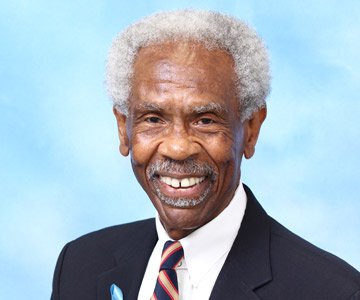Dr. Eric Griggs, or “Doc Griggs” as he’s called, is a New Orleans based community medicine doctor and health educator. He graduated from the University of Notre Dame and Tulane University School of Medicine. His mantra is “Get checked. Get fit. Get moving!”
Charlie Hill is a retired executive vice president, human resources for Landmark Media Enterprises. He earned a Bachelor’s in Economics from Virginia State College and a MBA degree from Hampton University. The governor of Virginia recently appointed Hill to a second four-year term as a member of Virginia State University’s Board of Visitors. He’s a proud Virginia State alum and a member of Omega Psi Phi fraternity, inc.
Mr. Hill was diagnosed with prostate cancer in 2002 and he prefers to be called a warrior versus a survivor.

WHAT IS PROSTATE CANCER?
Prostate cancer starts in the cells of the prostate gland. The prostate is a sex gland in men that sits just below the bladder. It’s about the size of a walnut. It wraps around the tube called the urethra, which carries urine out of the bladder to exit the body. Prostate Cancer is the uncontrollable and excessive growth of cells in the gland.
WHO IS AT RISK FOR PROSTATE CANCER?
Nearly 2 of every 3 prostate cancers are found in men 65 and older. As a man gets older, his chance of getting prostate cancer increases. African-American men are also more than twice as likely to die of prostate cancer as white men. But in recent years, death rates have gone down faster in African-American men than in white men. Older Black men whose father or a brother has been diagnosed are at greatest risk.
WHAT ARE THE SYMPTOMS OF PROSTATE CANCER?
Early prostate cancer usually causes no symptoms. Men who have prostate cancer can be symptom-free for years. But as it grows, prostate cancer can cause some symptoms. Men should see a health care provider if they:
- Have to urinate often, especially at night
- Have trouble starting or stopping urine flow
- Have a weak or slow urine flow
- Have blood in the urine or semen
- Feel frequent pain or stiffness in the lower back, hips, or ribs
WHAT OFTEN PREVENTS SUCCESSFUL EARLY DETECTION AND TREATMENT FOR AFRICAN-AMERICAN MEN?
Prostate cancers are less likely to be detected in the early stages among African-Americans because research shows they are generally less likely to have health insurance and have less access to health care. African-American men are less trustful of their physicians than are white men, less likely to see the same doctor each time they go a visit or care, and less likely to be screened for prostate cancer.
WHAT ARE YOUR PROSTATE SCREENING RECOMMENDATIONS?
Promote knowledge of early detection through awareness and educational activities that focus on the benefits and potential harms of PSA testing and wellness involving diet, nutrition, exercise, weight control, psychosocial and cultural sensitivities starting at age 35. Baseline PSA testing for men of African descent and other men deemed to be at high-risk for prostate cancer is suggested beginning at age 40 for predicting their risk of prostate cancer.
WHAT IS THE 100 BLACK MEN OF AMERICA ORGANIZATION DOING TO ENGAGE MEN AND ENCOURAGE EARLY DETECTION?
All 100 Black Men of America Chapters are being encouraged to host at least one prostate cancer awareness/educational event annually. This means the 100 chapter network is fully engaged in educating men across the country on the benefits of prostate cancer early detection, diagnosis and treatment options.
HOW LONG DOES A PROSTATE EXAM TAKE AND HOW OFTEN SHOULD MEN GET THE EXAM?
Men should make individualized decisions to be tested and examined based on their risk factors after discussion with their health care provider. The exam takes no longer that a few seconds.
AT WHAT AGE SHOULD MEN GET A PROSTATE EXAM?
Baseline PSA testing for men of African descent and other men deemed to be at high-risk for prostate cancer is suggested beginning at age 40 for predicting their risk of prostate cancer.
IF YOU HAVE A HISTORY OF CANCER IN YOUR FAMILY, SHOULD YOU GET CHECKED ONCE OR TWICE A YEAR FOR CANCER?
Rarely is screening recommended more than once a year, However, we advise that screening option frequency be discussed with primary care physicians.
WHAT REASONS/EXCUSES HAVE YOU ENCOUNTERED FROM MEN NOT GETTING TESTED FOR PROSTATE CANCER?
AA culture in the Black community for men to resist seeking health care for prostate concerns and having fear about rectal exams or about loss of erectile function from treatment. Since 2012, another reason is confusion caused by conflicting opinions and recommendations.
IS PROSTATE CANCER CURABLE? IF SO, WHAT ARE THE CHANCES OF IT RETURNING?
With early detection, prostate cancer is 100% treatable. Early diagnosis and treatment leads to better outcomes. Knowledge, Faith and Early Detection Matter Most
IF I’M NOT OF AGE TO A RECEIVE PROSTATE CANCER EXAM BUT I HAVE SOME OF THE SYMPTOMS, CAN I REQUEST THE TEST ANYWAY?
Men who have a family history of prostate cancer may consider earlier screening. Screening options should be discussed with your health care provider.
WILL INSURANCE COVER THE COST OF A PROSTATE EXAM IF YOU’RE NOT AT THE RECOMMENDED AGE?
Insurance may be available for those men who have a history of prostate cancer in their family.
Dr. Griggs answers your Text Tom questions on the next page:


















